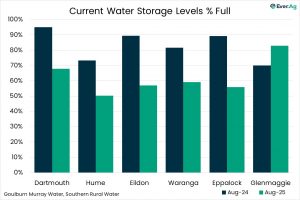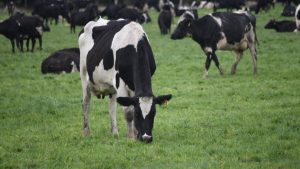
Victoria’s power supply was largely secure during the crisis because of its connections to the Snowy Hydro scheme and the Latrobe Valley’s coal-fired power stations, but farmers are worried power shortfalls could become more common as the energy industry transitions away from fossil fuels.
The most energy-dependent are the dairy farmers, who need power to milk their herds, clean their sheds and store their milk.
Gordon Emmett runs a 200-head dairy farm at Stanhope.
He said the energy issue was frustrating to watch.
“It annoys me. The whole thing has been mismanaged,’’ Mr Emmett said.
“For ages we were told to put solar in and power prices will go down, but it doesn’t matter how many solar panels you put in, the price keeps going up.
“We’ve got three solar systems on our farm.
“In our region most of our power would come from the Snowy Hydro I think, and maybe Latrobe, but most from hydro.
“The real question is what will they do to us if Melbourne starts running out of power?”
Merrigum dairy farmers Jamie Walford and Sally Rowe have just moved into the area from south-west Victoria.
“I know if it ever got bad, they’d take our power to protect Melbourne,” Ms Rowe said.
“We’ve got no generators on the farm. We’ve had a few people come out to look at solar, but that will take some time.”
Wyuna East dairy farmer Julie Young runs a 450-cow herd and was worried about energy prices going forward.
“I’m concerned about the power,’’ Mrs Young said.
“We recently changed power providers because our energy bill doubled.
“Switching power providers almost halved it. I think it brought our bill back to the original price, give or take two cents.
“The interesting thing is the original energy provider told me to switch providers.
“I was already doing it, but it was strange they admitted I should go.”
Yarroweyah dairy farmer Daryl Iskov said the headlines prompted him to go out and buy his farm’s first generator.
“We’ve purchased a generator because of all this and we reckon we’re going to need it,’’ Mr Iskov said.
“We’ve never had a generator before this.”
Meanwhile, many northern Victorian households will be paid less for the power their home solar cells generate from July 1.
The Essential Services Commission has allowed power retailers to pay less for the feed-in tariff due to a decision made in February.
The commission forecasted that wholesale power prices would fall mid-year, and hence approved a drop in the feed-in tariff.
A spokesperson for the commission said there was no provision to review the annual decision in the light of rising power prices.

























